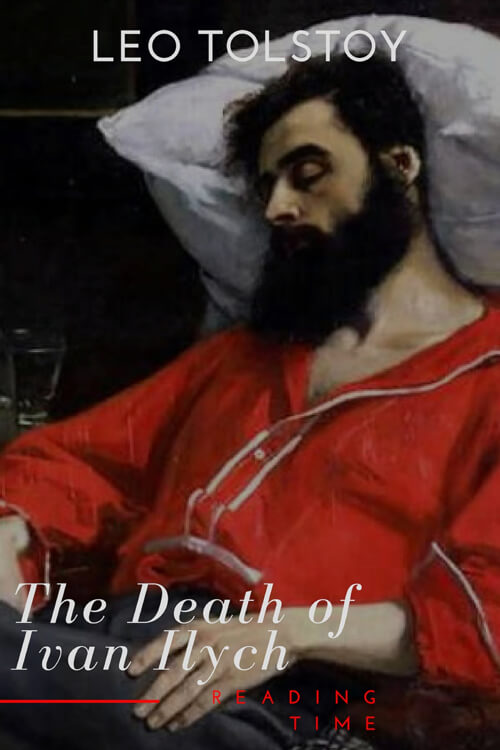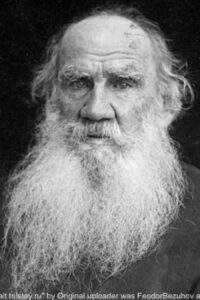
The Death of Ivan Ilych
During an interval in the Melvinski trial in the large building of the Law Courts, the members and public prosecutor met in Ivan Egorovich Shebek’s private room, where the conversation turned to the celebrated Krasovski case. Fedor Vasilievich warmly maintained that it was not subject to their jurisdiction, Ivan Egorovich maintained the contrary, while Peter Ivanovich, not having entered into the discussion at the start, took no part in it but looked through the Gazette which had just been handed in.
“Gentlemen,” he said, “Ivan Ilych has died!”
“You don’t say so!”
“Here, read it yourself,” replied Peter Ivanovich, handing Fedor Vasilievich the paper still damp from the press. Surrounded by a black border were the words: “Praskovya Fedorovna Golovina, with profound sorrow, informs relatives and friends of the demise of her beloved husband Ivan Ilych Golovin, Member of the Court of Justice, which occurred on February the 4th of this year 1882. The funeral will take place on Friday at one o’clock in the afternoon.”
Ivan Ilych had been a colleague of the gentlemen present and was liked by them all. He had been ill for some weeks with an illness said to be incurable. His post had been kept open for him, but there had been conjectures that in case of his death Alexeev might receive his appointment, and that either Vinnikov or Shtabel would succeed Alexeev. So on receiving the news of Ivan Ilych’s death the first thought of each of the gentlemen in that private room was of the changes and promotions it might occasion among themselves or their acquaintances.
Read or download Book
Leo Tolstoy
Count Lev Nikolayevich Tolstoy (9 September [O.S. 28 August] 1828 – 20 November [O.S. 7 November] 1910), usually referred to in English as Leo Tolstoy, was a Russian writer regarded as one of the greatest authors of all time. He received nominations for the Nobel Prize in Literature every year from 1902 to 1906 and for the Nobel Peace Prize in 1901, 1902, and 1909.
Born to an aristocratic Russian family in 1828, Tolstoy’s notable works include War and Peace (1869) and Anna Karenina (1878), often cited as pinnacles of realist fiction. He first achieved literary acclaim in his twenties with his semi-autobiographical trilogy Childhood, Boyhood, and Youth (1852–1856) and Sevastopol Sketches (1855), based upon his experiences in the Crimean War. His fiction includes dozens of short stories, such as “After the Ball” (1911), and several novellas, such as The Death of Ivan Ilyich (1886), Family Happiness (1859), and Hadji Murad (1912). He also wrote plays and essays concerning philosophical, moral, and religious themes.
In the 1870s, Tolstoy experienced a profound moral crisis, followed by what he regarded as an equally profound spiritual awakening, as outlined in his non-fiction work Confession (1882). His literal interpretation of the ethical teachings of Jesus, centering on the Sermon on the Mount, caused him to become a fervent Christian anarchist and pacifist. His ideas on nonviolent resistance, expressed in such works as The Kingdom of God Is Within You (1894), profoundly impacted such pivotal 20th-century figures as Mahatma Gandhi, Martin Luther King Jr., and Ludwig Wittgenstein. He also became a dedicated advocate of Georgism, the economic philosophy of Henry George, which he incorporated into his writing, particularly in his novel Resurrection (1899).
Origins
The Tolstoys were a well-known family of old Russian nobility who traced their ancestry to a mythical nobleman named Indris described by Pyotr Tolstoy as arriving “from Nemec, from the lands of Caesar” to Chernihiv in 1353 along with his two sons Litvinos (or Litvonis) and Zimonten (or Zigmont) and a druzhina of 3000 people. While the word “Nemec” has been long used to describe Germans only, at that time it was applied to any foreigner who did not speak Russian (from the word nemoy meaning mute). Indris was then converted to Eastern Orthodoxy, under the name of Leonty, and his sons Konstantin and Feodor. Konstantin’s grandson Andrei Kharitonovich was nicknamed Tolstiy (translated as fat) by Vasily II of Moscow after he moved from Chernihiv to Moscow.
Because of the pagan names and the fact that Chernihiv at the time was ruled by Demetrius I Starshy, some researchers concluded that they were Lithuanians who arrived from the Grand Duchy of Lithuania. At the same time, no mention of Indris was ever found in the 14th-to-16th-century documents, while the Chernihiv Chronicles used by Pyotr Tolstoy as a reference was lost. The first documented members of the Tolstoy family also lived during the 17th century, thus Pyotr Tolstoy himself is generally considered the founder of the noble house, being granted the title of count by Peter the Great.






